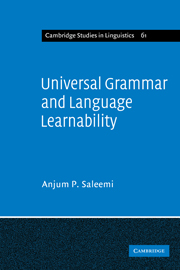Book contents
- Frontmatter
- Contents
- Preface
- 1 The problem of language learnability
- 2 The components of the linguistic system
- 3 The components of the learning system
- 4 Approaches to parameter fixation
- 5 The scope and limits of the current approaches
- 6 The distribution and variety of null subjects
- 7 Augmented parameter fixation: pro subjects and learnability
- 8 Review and integration
- Notes
- References
- Index
1 - The problem of language learnability
Published online by Cambridge University Press: 04 August 2010
- Frontmatter
- Contents
- Preface
- 1 The problem of language learnability
- 2 The components of the linguistic system
- 3 The components of the learning system
- 4 Approaches to parameter fixation
- 5 The scope and limits of the current approaches
- 6 The distribution and variety of null subjects
- 7 Augmented parameter fixation: pro subjects and learnability
- 8 Review and integration
- Notes
- References
- Index
Summary
This book is concerned with the learning of language as a cognitive system, assuming Chomskyan nativism and employing conceptual and methodological tools provided by the theory of learnability. Specifically, it seeks to explain the rationale, and present a demonstration, of the logical approach to the study of language acquisition in a universalist framework, with a considerable part of it focusing on the parameter-setting model. As we attempt to contribute to the ongoing debate on the learnability of natural language syntax, we indulge in a certain amount of syntactic analysis as well, but with the primary aim of optimizing learnability solutions rather than syntactic ones. Thus, weaving syntactic analyses into the formal fabric of the theory of learnability, this study is intended to show that a selfcontained linguistic theory cannot by itself be psychologically plausible, and that such a theory will need to depend on a compatible theory of learning, dealing with developmental as well as formal issues, if it has to have any cognitive pretensions at all. It seems that the best way to practise cognitive science, to which both linguistics and learning theories may be considered to belong, is to connect mental representations with related learning principles, analytical with procedural issues.
We start off with a discussion of the basic puzzles of language learning, and in the process undertake an analytical review of certain key aspects of the linguistic and learning theories, thus paving the way for much that is to follow.
- Type
- Chapter
- Information
- Universal Grammar and Language Learnability , pp. 1 - 14Publisher: Cambridge University PressPrint publication year: 1992



